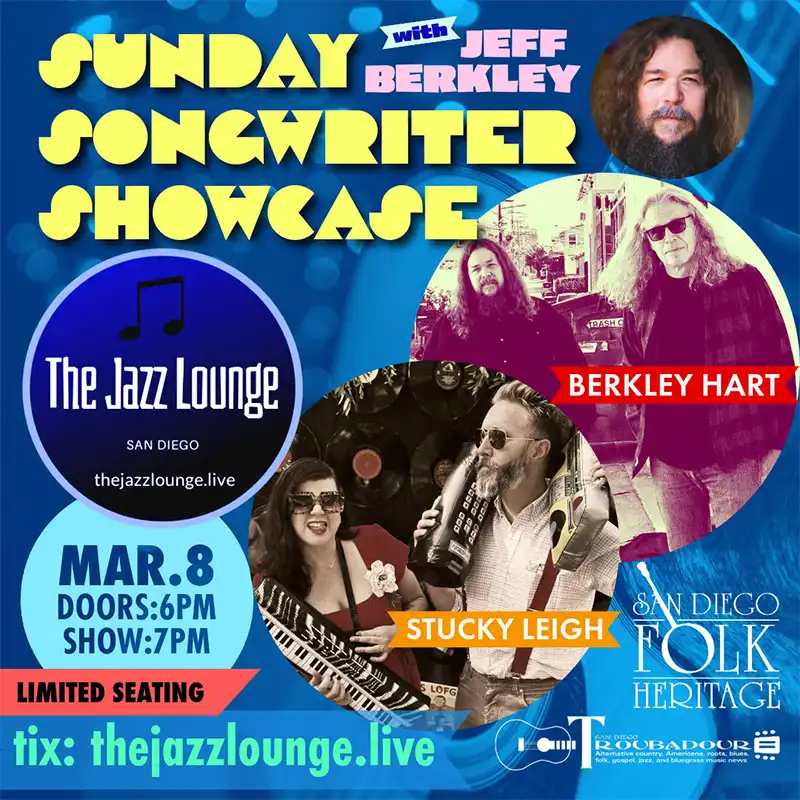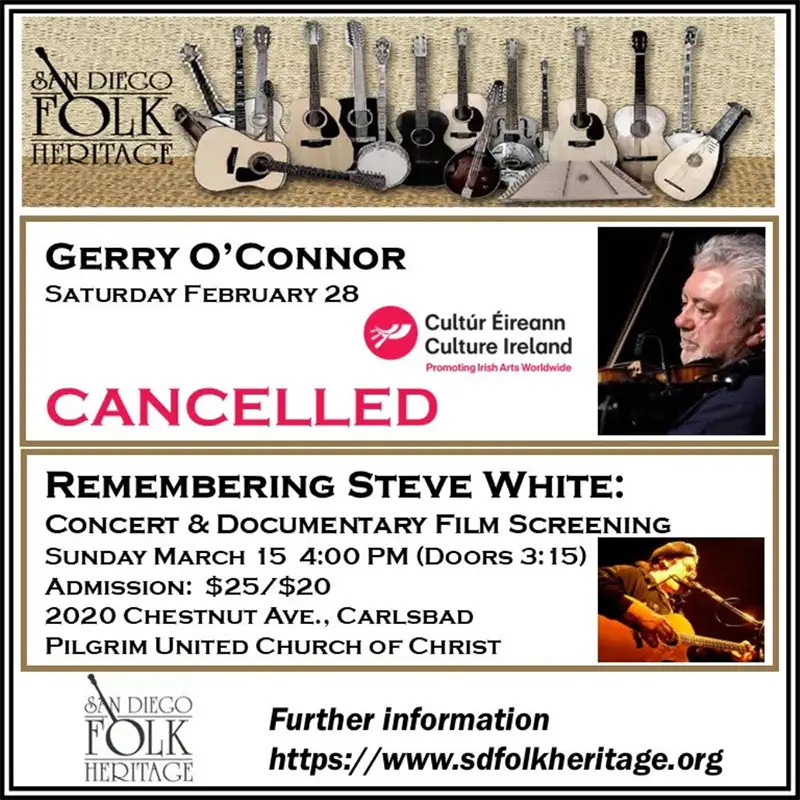Cover Story
Ben Powell’s Blues Go Roots Deep
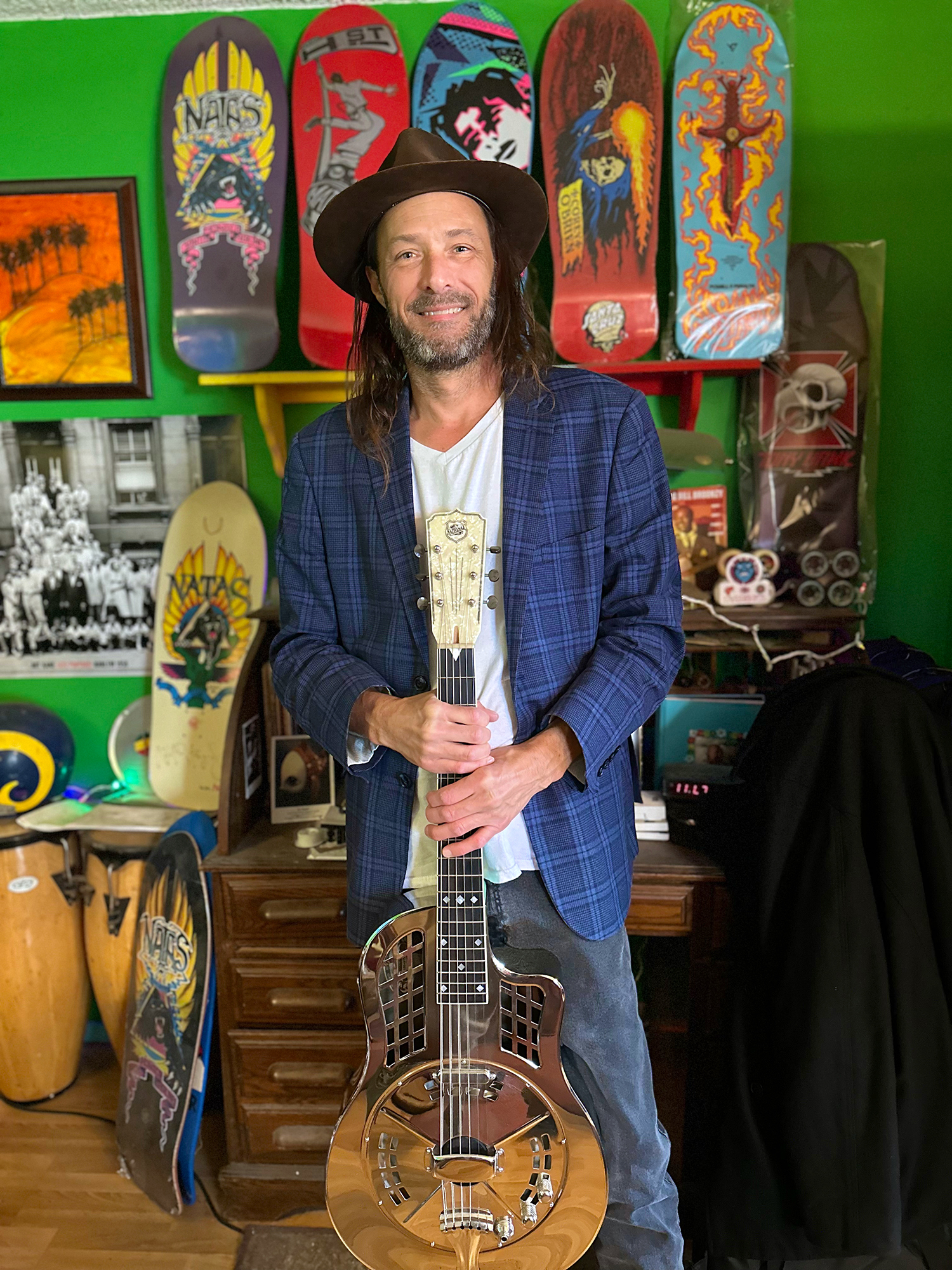
Ben Powell. Photo by Dan Chusid.
Ben Powell has traveled many roads as a bluesman. A native Californian, he would spend a portion of his early life in the rural community of Clovis, just outside of Fresno. His mother was an educator and when she took a position with the Department of Defense, the Powell family packed up and headed overseas. Moving from small town America to Germany, Ben was instantly exposed to an international array of diversity and culture, affording him not only an education but a social awareness with global perspective as well. The world was changing and Powell would witness it up close and personal during the fall of the Berlin Wall. So it shouldn’t come as any surprise that exploration and history would be a recurring “key” to his highway.
His musical journey began with the saxophone; he also kept time behind a drum kit and eventually picked up the harmonica, but it would literally take a broken ankle to finally put a guitar in his hands. His fascination with music, specifically blues music and those who play it, continues to lead him down the path of discovery. Jimi Hendrix, Bob Dylan, and Hot Tuna initially, which led him to McKinley Morganfield and Chester Burnett, which in turn led to the Rev. Gary Davis, Son House, and Jelly Roll Morton…you see where we’re going with this?
Powell’s obsession with digging deeper now includes his own instrumentation. Using an old school style resonator guitar and multiple finger-picks, he’s fluent in a variety of musical genres with a full songbook loaded with varying sounds, emotions, and depth. Ben’s proficiency and skill set have not gone unnoticed. A San Luis Obispo Company has long-retained Powell to rep for their National Reso-phonic Guitars as an artist/dealer. Nice work if you can get it.
A little taste of Ben Powell.
San Diego Troubadour: When we sat down to talk, I had to ask. Have you ever owned an electric guitar?
Ben Powell: I have a wonderful Telecaster and it sits in the closet. [he grins] But recently I got an amplifier that does it justice. I’ve got all sorts of new sounds and all that does is leads you to, or let’s you compose in a new style; it’s inspirational. That’s what I love about the different instruments, whether they’re acoustic, resonators, or electric they’ve all got different songs in them for me, and it really inspires me. And I’m on a streak of writing different types of stuff other than country blues and having a little fun with it. Some of them are a little more Americana or country/bluegrassy; others are more like uptown jazz like Lonnie Johnson, T-Bone type of stuff, and it’s just super fun!
You never seem limited in your music or your approach to songs. I hear some Charlie Christian jazz along with that grittier Delta and Piedmont earthiness, both in your covers and your original material.
Thanks for noticing. It’s a big umbrella to work under, and I’m lucky to have that. People have always done that in roots music—everybody from Woody Guthrie to Bessie Smith—talking about real stuff and that’s what makes it roots, that’s what makes it folk music, and that’s my genre. I like other kinds of music as well.
Most people know you as a singing-songwriting guitarist, but I know you started on the saxophone. Did you ever go back and pick it up?
Not since I put it down. I love it. If I had one, if I could…I’d blow it! It was my introduction to organized music and I had a Tupperware drum set before that! I played drums to my dad’s record collection, but I got into drums after sax in high school, and punk music was a big influence on me. All that ’80s stuff.

Photo by Rebecca Leak.
How old were you when you moved to Europe?
I was 12. My mom was a public school teacher in Clovis, California and got a teaching job with the Department of Defense teaching overseas in the mid-’80s in Germany. I lived there during Jr. High and High School, about six years during my formative years and made great friends both American and German. A got a ton of travel in; I played in bands and played gigs around. I was there when the wall came down. There was a lot to take in and it was a hyper-political time; East Germany opening up to West Germany was a big deal. It gave me great perspective.
You make your way back to America…
I came back alone, by myself. I was 18 years old and didn’t know a single person here. I had an aunt and uncle and one skateboarder friend. Looking back it would have been horrifying, but at the time I loved it. It was freedom. I had no job, I had no money, I had nothing, and it was great! [laughing] I was skateboarding and working in a pottery shop for awhile. I did all kinds of retail gigs like Dairy Queen and Target, and I was a skateboarder. That’s why I picked this town; I worked at the YMCA for a little while as a skateboard instructor.
Was there always music?
When I was working at the pottery shop in Del Mar, I was interested in music and I was writing songs—mostly poetry, really—but I knew I wanted them to be songs. But I didn’t have a band and I wasn’t playing an instrument at the time. I picked up guitar after I broke my ankle skateboarding in 1993, and I literally never looked back. My friend brought me over an electric guitar and no amplifier, and I started playing guitar and learning a couple of notes from Hendrix. And I thought, how neat is this? I got a little acoustic guitar and started playing, and I got really serious about it. I was into music so much then and learning so much about folk music and blues.
And how I got into blues, I was working one day at my pottery shop, and it was the perfect blues backdrop. This guy put on Son House and I walked into the room and heard this music and “what’s this?” Ah, it’s Son House and I was just blown away. One of those moments and I’d never heard anything like this. I was listening to Hendrix and Hot Tuna, Clapton, and all that, but this was just a whole other thing. I went home and researched who he was and found out that Jorma Kaukonen was covering Gary Davis songs and Jelly Roll Morton and boom, how can you not fall in love with that music? And country blues… that was it.
When I heard those guys I went to school, I went to college. I bought everything I could find, read everything I could find—every liner note, every book. I really, really studied the music and fell in love with 15 guys or so, the core guys like Blind Blake, Blind Boy Fuller, Fred McDowell, Blind Lemon Jefferson, Tommy Johnson, and, of course, Robert Johnson. And who did Robert Johnson listen to? Son House. And who did he listen to? Charlie Patton. I like to take it all the way back, and who did they listen to? So, I started with Hendrix and ended up with Charlie Patton.
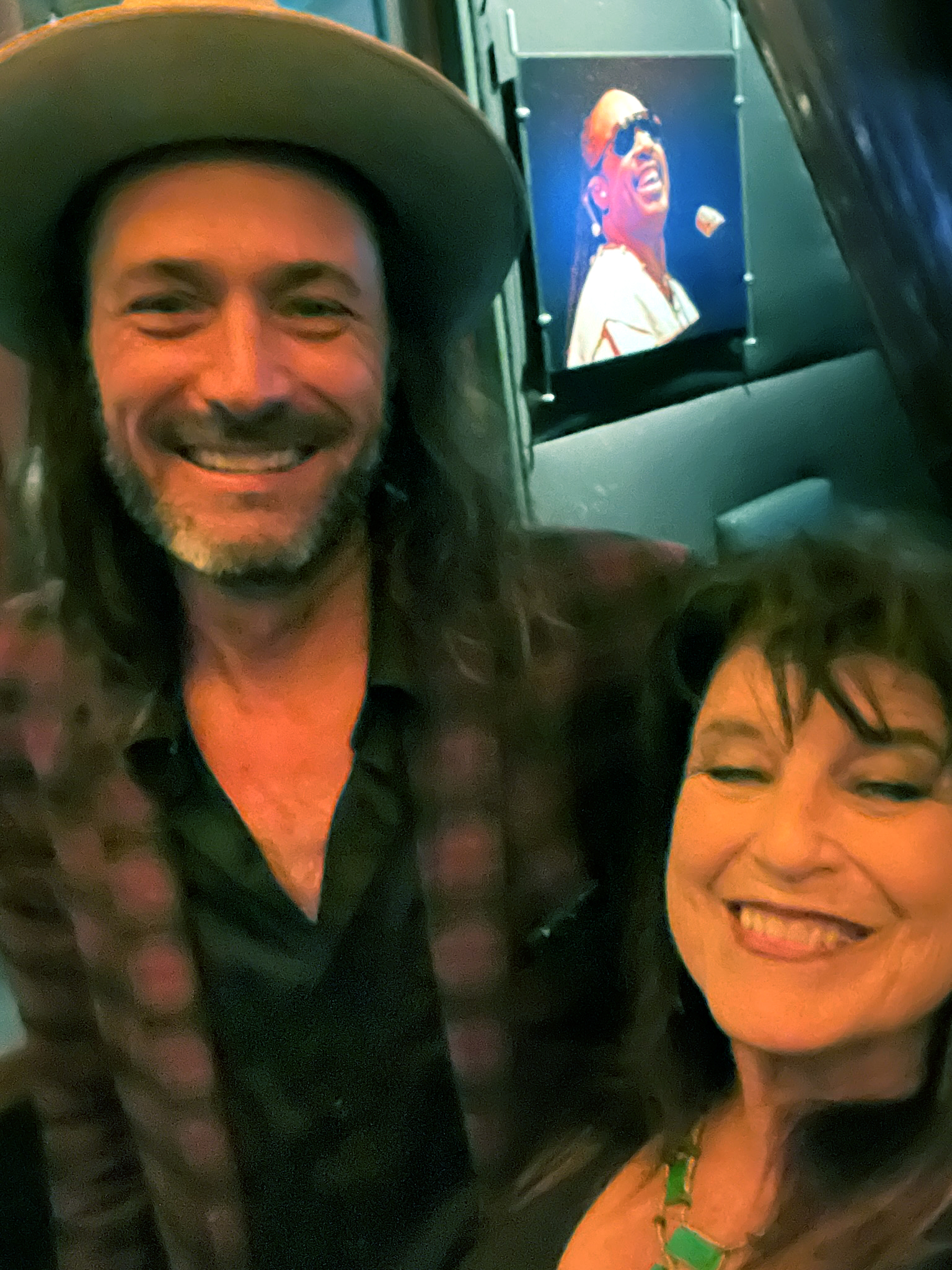
Ben Powell & Michele Lundeen (and Stevie Wonder).
When did you start playing in public?
I was gigging about three months after picking up the guitar. At coffee shops mostly and got to meet some cool people in San Diego. Some North County legends like Steve White, Candye Kane, and Thomas Yearsley. I met Nathan James not too long after that; he was just a kid playing so incredibly well and we hit it off immediately. It was a great little scene up in North County.
Those early influences and that style of playing seem to be just as relevant in our music today. For Ben Powell is it the depth, the stories, the foreboding?
Musically, I can tell you about the blues and roots music, early jazz, ragtime, and all that stuff; Delta, Hawaiian, early country, Appalachian fiddle tunes, which eventually matriculated into America. Whether it’s direct or indirect we have a hell of a deep well to draw from…and I’m a beneficiary of that. I don’t invent anything but after doing it for 20 or 30 years now, hopefully I [air quotes] get to invent my sound, but it is 100% evolved from American roots music. And not just one type, but many types. I feel hyper aware that we have that deep well of music to draw from. Not only the guys we mentioned but so many others…Piedmont style, Delta blues, Texas blues—honestly so much stuff. Even in California we have our own great history, but my main influence musically is from the South. I compose in different styles and that’s super fun now that I’m a little more mature musically; I’m not just flying by the seat of my pants or going off of pure inspiration. I can actually think about something like, you know, I want to write a honky-tonk record and I can draw from those great players and great songs. I’m just being more aware of what I’m doing. When you first start there is no self-awareness and if there was…I probably wouldn’t have done it. When you’re getting started, if you were to think about what you’re doing, you probably wouldn’t do it. I’m going to jump up there and entertain people…luckily, I didn’t think too much about it and just did it.
But those are the people I’ve loved and admired: the punk rockers, the skateboarders, the honky-tonks and the blues; my particular interest is the country blues before Muddy took it uptown, before it got plugged in and electrified…which is wonderful and I love it, but for me it was just before that. It’s history man, and I had a great time learning about it and it’s a real lens to look through. If someone wants to learn about American history go watch the Ken Burns jazz documentary, because jazz is a great lens to see it through, it’s way different than the school books.
Are you still repping for National Reso-phonic Guitars?
I’m an endorsed artist for them, meaning I still get to sell guitars if anybody is looking for a National guitar, so I’m an artist/dealer for them. I have a great relationship and they’re a wonderful company up in San Luis Obispo. I’ve been friends with them going on 20 years.
How many CDs do you have now?
I have six and the most recent thing I did was a honky-tonk EP titled My Lonesome Heart, which has three or four original songs, but I didn’t release that in a hard copy. It’s just up on my website [benpowellmusic.com] I really like it, I’m proud of it. It has some great local musicians from here in town; the sessions were recorded once again at Sacred Cat Studios in Oceanside by Nathan James, who also played bass, Rick Schmidt on steel, Clinton Davis on fiddle and banjo, and Bob Ryan played some guitar.
But I have so many songs to record that are not recorded yet. That’s mainly what I’ve been doing—writing for the last four years or so. And I know that’s way too long to not release a record, but there was Covid and the fact that people weren’t buying music for awhile. But I think that’s coming back a little bit. I really want to record a lot of songs, so that sooner than later I’ll have a flood of them. I want to connect with Nathan [James] or Scottie Blinn to record; I have the capability to record myself, but it’s a whole different deal to do that. I need help.
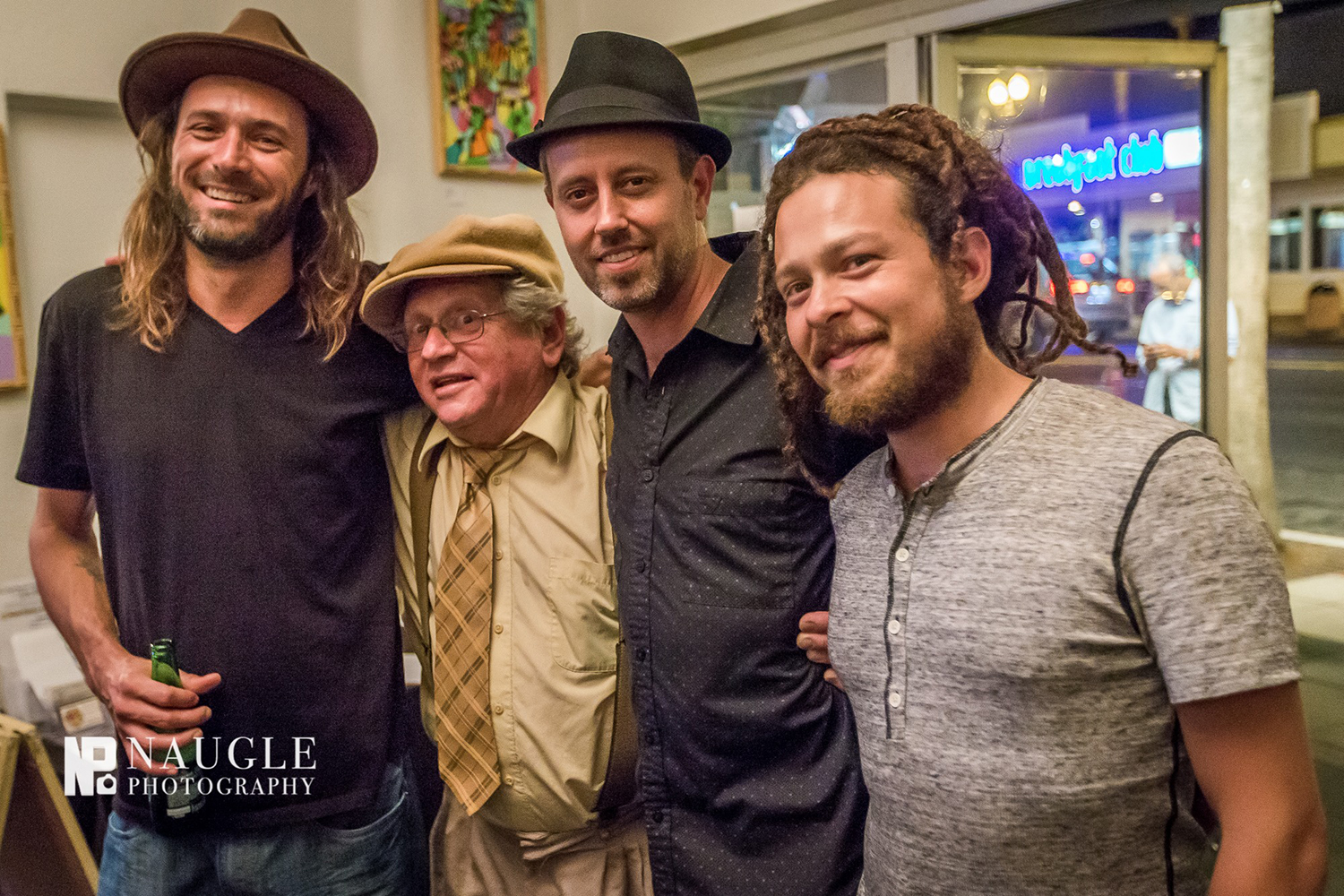
Powell with Robin Henkel, Nathan James, Nathan Rivera. Photo by Jon Naugle.
There’s something special about collaboration, that creative spark that comes from working with other artists in the studio.
Yeah, I’d love to do a live blues record. If I do blues, it’s going to be a live record, and I know Scottie does some of that and I’d love to talk to him about it. My other stuff is not so much blues; I’ve got so much stuff—sounds and songs written in different styles. It’s exciting but also a bit overwhelming but I’ve got to get on it.
One of your earlier CDs, New World Blues, featured the late James Harman and the songs really dealt with relevant issues; music with a conscience.
They’re all original songs on that along with Carl Sonny Leyland, thanks to Nathan. Some of my songs…I’m not in the South and I’m not a sharecropper, I’m out here and living in this world and I’ve heard from many of my favorite artists that it’s a good idea to learn a style of music, like blues. But once you get your own thing going, it’s important to contribute, to put back and not just take. Anybody can get up there and just play a rock ‘n’ roll song; it doesn’t matter… if it sounds good, feels good, and people can dance to it. Who cares where it came from or what it’s about? But if you’re singing reggae or singing blues, there’s a specific reason that music exists. And it’s not because of my culture, so I have to walk this line, respecting where it’s from, and understanding that I don’t own it; I don’t own its course and I don’t own its history. But I’m not faking it and I’m not doing this because it’s making me a bunch of money. Because people ask me why did I chose blues? I didn’t choose it and it’s corny and hokey to say it, but it kinda chose me! And it’s continuing to do that; it wasn’t a plan. I’m not gonna go and make a bunch of money being a blues singer.
I’ve always liked that idea of every time you write a song, record a song, and put it out there you’re contributing… adding to the soup. With that in mind, I’ve tried to write about things that are happening in the world. I don’t want to sing about how bad my girl treats me; first of all, it’s not that interesting, second, there’s a lot more important stuff going on. New World Blues was an effort in that.
You mentioned Woody Guthrie. Did you listen to a lot of his work as well as Pete Seeger’s?
Absolutely! They definitely went through my filter, no doubt about it. Through Bob Dylan, finding Bob Dylan, and who did he listen to? That’s what I do. I find out who my favorite guys liked, you know? Turns out I end up liking them, too.
Not long ago you picked up a Best Blues Album nomination at the San Diego Music Awards for your recording Rise Up Singing. That must have felt good,
It did, it did. I got an email saying I was nominated, and I was super-stoked. The coolest thing about it is that they knew who I was. Because in this business not a lot comes to you, you have to hustle and get turned down literally a hundred times before you get one. The rejection rate is phenomenal…if you love rejection; this is the business for you. [laughing]
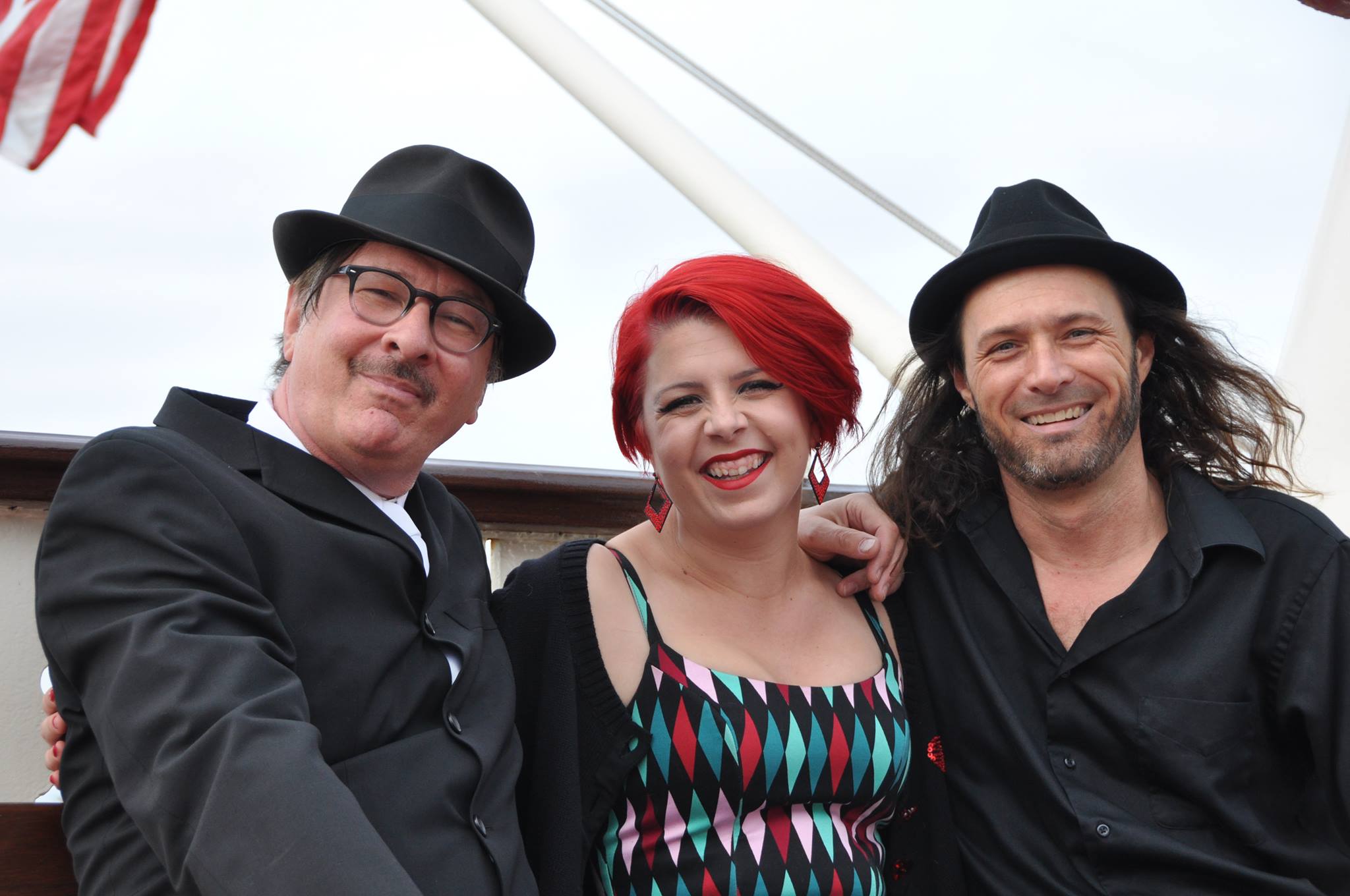
Powell with Gregory Page & Whitney Shay. Photo by Rebecca Leak.
Talk a little about your writing process and do you write with an instrument?
Well, it is a process but it’s a process I have not 100% figured out! [laughing] And I’m old enough now to be okay with that. I used to stress about “Oh, I haven’t written a song in a month!” Now I understand I’m not in charge of that. I can’t just…its four o’clock on a Friday, I have three hours and I’m going to sit down and write a song. That is not me; it comes when it comes and I have to be there for it. I have to get out of bed and write it down, or if I think about it, I have to get out of the freaking shower and go write it down. Otherwise it’ll be gone! I’ve learned that. I’ve lost lyrics, I’ve lost melodies…dammit, dude. I’ll spend the rest of the day trying to get it back…and it’s gone! So, I get out of the shower now and write it down or hum it into my phone, whatever! So that’s how I show my respect for the process. I’m not in charge of it.
Most of the time I do start with the guitar, picking the guitar and if something fun comes, great. Sometimes, when you’re real lucky it comes with lyrics and a melody. Sometimes, sometimes you sit right down and…There. It. Is. It’s a song. It doesn’t happen very often but it does happen. And then there are times I’ll be working on shit for years! My house is all covered in notes! [laughing] All notebook papers, the backs of receipts and shit! I swear, but when I’m real serious about a song I’ll pull out an actual piece of paper and I’ll jot down what I’ve got; I’ll put the chords where I want them and I’m off and running. Sometimes if I’m lucky, it will finish itself, but it’s a process that will take three or four days easily…no problem. And that’s my process…it’s cookin’! I go to sleep and wake up and I’ve got another verse or a change, maybe a beat and I just keep it going until it’s somewhat done. The more you do it, the better you get at it. There’s a method to it. For me now, it’s just keeping all my songs fresh, playable, and not forgetting them. I’ve got 60 original songs that I’ve got to do something with and those aren’t what I’m playing at my gigs. They’re different and they need help—a bass player or a keyboard or horns—so I’ve got to keep them fresh at home till I start playing them. When writing happens, it happens, and I love it.”
You have a new teaching gig?
I have a new part-time gig at a new art center in Encinitas. It’s called the Pacific View Art Center. It’s on Third Street, I don’t know if you know where the boat houses are, but just south of there. Coincidentally, when my daughter was born, I lived right on that corner of Third and F Streets. So, it’s right in my old neighborhood and they have all sorts of cool classes: music production, video production, screen printing, painting, weaving, dance classes, and I’m teaching some music classes. I’m doing a couple of blues classes, open-tuning slide classes, a swing jazz guitar class; spring signups are currently happening. But I’m having a ball doing it, it’s really fun and it ties right into education, art, music, and creativity. I used to participate in the Blues in the Schools program, and it was always great fun playing with the kids and handing out kazoos. Now my classes are in the middle of the day and mostly retired folks want to try something new…but for me it’s always rewarding.
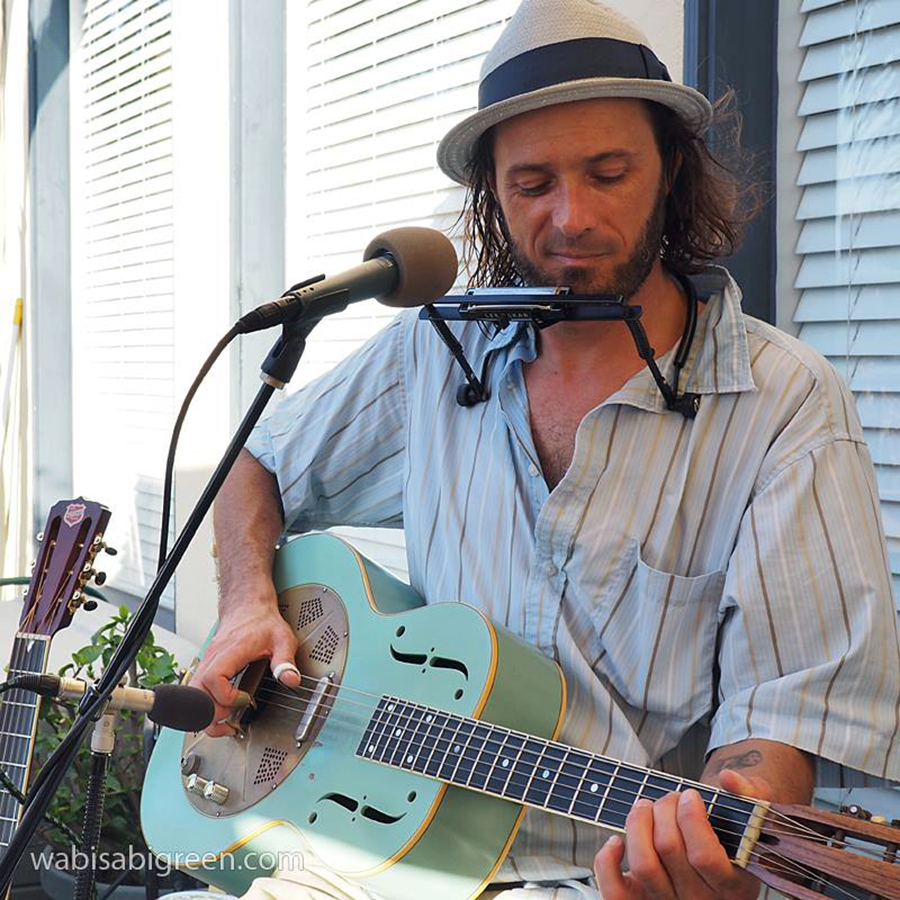
Photo by wasabigreen.com.
Going forward what’s the future hold for Ben Powell?
Well, I need a band. Holler at me, bass players and trumpet players…I do want a band. I got so much stuff I want to do musically. I’m thankful to be a part of the San Diego music community and there are so many new musicians I don’t know. When I check to see who’s playing at the clubs, the San Diego Music Award nominees…I’m the old guy all of a sudden. There are a lot of new people. You don’t think about it as a younger person, but I’m 50 now and you start thinking legacy and what you’re doing here. My choice of doing what I do; if I could make changes, I’m sure I would, but I’d still choose to do what I’m doing. I’m proud to be a musician, I’m happy to be a musician and the tons of sacrifices to be a part of that and I wouldn’t change any of that, for sure. The goal, I guess, is to just get in front of more audiences…I’ve gotten away from booking and hunting gigs, so I need to get back to it and get out there. I want to do it and I love connecting with people because that’s when I feel the most happy and most fulfilled; most valued as a part of society connecting with people through my music.
Over the years Ben Powell has appeared on the national stage at blues festivals like Telluride, SXSW, and our own San Diego Blues Fest. He’s opened shows for Buddy Guy, Johnny Lang. and, more recently, here at home for Kenny Neal. Check out his Instagram or Facebook pages @benpowellmusic for the next opportunity to see him live or peruse his website www.benpowellmusic.com for a wide range of recordings and videos. Whether you’re a fan of the early blues from iconic bluesmen like Blind Willie Johnson or Fred McDowell or you’re just drawn toward more original songs that elevate and stimulate your social awareness, the music of Ben Powell can hook you up.





